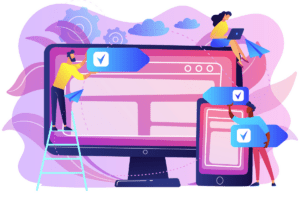Companies that take advantage of omnichannel marketing are one step ahead of the competition. In a world saturated with competition, it’s essential to take every opportunity to stand out from the crowd. Otherwise, your company will fall behind the competition and it may be hard to recover. Lucky for you, omnichannel marketing can be pretty easy to implement and can drive a ton of success for your company. Keep reading to find out more about the importance of omnichannel marketing and how to implement it in your everyday marketing initiatives.
What is Omnichannel Marketing?
Omnichannel marketing refers to carrying a consistent brand image across the board. This includes all marketing activities on social media, your website, traditional advertising, and how you communicate with your customers. It’s much more than using consistent brand colors and logos, it’s a mindset that your teams must consider when communicating with your customers. Before we dive into why omnichannel marketing is important, let’s go over omnichannel vs. multichannel marketing.
Omnichannel vs. Multichannel Marketing
Commonly companies will think that because they are using multiple channels to communicate their brand message that they are automatically using an omnichannel strategy. That is not true. Just because a company is on social media, has a blog, and a newsletter does not mean that they are all aligned. If all of these marketing initiatives do not support each other, then there is a good chance that the company is using multichannel marketing. Multichannel marketing is not bad, but it’s not as effective and cohesive as omnichannel.
An example of this would be if you announce a new product in your newsletter, but it’s nowhere to be found on your social media channels. If an email reader clicks on a social media link that you have on the bottom of the email to go to Twitter, there should be information that they can keep learning. Consistency across all channels is key, but we will talk about this more later. First, let’s go over why omnichannel marketing is so important.

Why is Omnichannel Marketing so Important?
By providing your customers, prospects, and followers with a consistent experience, they will be more likely to flow through your sales funnel and continue to be brand loyal. One bad or confusing experience may lead to a loss of a customer. To prevent this, we want to provide our customers the best experience possible. Every touchpoint they are involved with should carry the same message and be consistent with what your brand represents. Let’s go over a few specific ways omnichannel marketing can improve your customer experience.
Brand Recognition
Like I mentioned before, you want to make sure that your customers are able to pick your brand out of a lineup. A great example of a recognizable brand is McDonald’s. McDonald’s is a global brand, but in every country and marketing initiative, they use their iconic golden arches. Even if you were traveling in another country, you would know that logo anywhere. You will want to try to convey the same message with your logo, colors, slogan, and other features of your brand. If you use one logo on your social media channels and another on your website, your prospective customers are going to get confused and may not convert.
Sales Funnel
At every point of contact with your customer, you will want to ensure they are getting a seamless experience. This is especially important in the awareness and interest phases of your sales funnel when your prospects are researching your company as well as your competitors. If they see your competitors providing them with a better digital experience, they may choose them over your company, even if your product is better. To learn more about sales funnels and how to integrate this concept into your omnichannel marketing, take a look at this article.
CLV
Customer lifetime value or CLV is one of the most important metrics in business. CLV is the measurement of how much your customer is worth to your company for the time that they stay with you. If you form a strong relationship with your customers, in addition to a high-quality product or service, they will be more likely to stay with your company for a long period of time. To improve your CLV, you can send branded emails, engage on social media, and improve your communication, all of which relate to omnichannel marketing. Customers that are brand loyal also tend to spend more money with that brand over the years.
Increase Your Revenue
Often the main goal that companies have is to increase their revenue. But, often the main struggle that companies face is how to increase their revenue. Well, omnichannel marketing is one of the easiest and most effective ways to do so. As mentioned, CLV directly correlates with revenue. The longer a customer is loyal to your company, the more money they will spend. So, by improving their experience with your company through omnichannel marketing, the more money they will spend. Your customers will also be more likely to refer others, increasing your revenue even more.

How to Implement Omnichannel Marketing
As you can see, there are a ton of reasons why companies want to focus on omnichannel marketing. Luckily, it’s pretty easy to get started and continue to use. Next, we are going to go over a few key concepts to keep in mind when performing omnichannel marketing.
Customer Centric Approach
When implementing omnichannel marketing, you’ll want to think about what your customers want to see. Generally, this concept is referred to as customer centric, meaning your business values your customers over revenue. By creating a customer centric environment, you’re more likely to retain long-term customers and generate more revenue overall, but it can take more time and money to get to that point. Customer centric companies tend to focus on providing their customers with a personalized experience based on their needs. By combining this concept with your omnichannel marketing, your company will be sure to generate more revenue and build long-term relationships with your customers.
Consistency is Key
As marketers, we’ve all heard that consistency is key. That couldn’t be more true for omnichannel marketing. After being customer centric, consistency is the most important factor to consider. Like I mentioned before, if a company is not consistent with its messaging and branding, then its prospects are going to drop out of the sales funnel. You can easily prevent this by regularly going through your marketing initiatives, like email campaigns, social media ads, organic social media content, SEM, and any other form of paid or organic marketing to ensure they are aligned with your branding.
Communicate
Sometimes when brands think about starting to implement omnichannel marketing they are going through a rebrand. If this sounds like you, take advantage of the opportunity to announce your exciting news on social media and in your email campaigns. This way your customers will not be confused about the change in branding. For example, you can create social media posts with a cheeky caption about how you’re improving your business, with a comparison of your old and new logo. If you’re not rebranding, it’s still important to communicate with your customers. If you’re not sure what they’re looking for, just ask! People love to give feedback and will be happy to share their thoughts. Take their ideas and use them to improve your new marketing initiatives.
Sales vs Marketing
A common mistake that I see is when a marketing team runs a promotion, but the sales team is not familiar with it. When a customer inquires about the promotion, the sales team needs to know exactly what the promotion is and what the ads said. Omnichannel marketing doesn’t stop at marketing. It’s a mindset that all of your employees must follow in order for it to provide the best customer experience possible. To ensure everyone is on the same page, it’s helpful to organize regular meetings to answer any questions that they may have. Now, let’s go over some specific marketing strategies that you can use to enhance your omnichannel presence.
Omnichannel Marketing Strategies
The nice thing about omnichannel marketing is that it can be easily incorporated into the marketing initiatives that you’re already doing. They just might need a little tweaking. Let’s go over some of the most popular ways to incorporate omnichannel marketing into your current marketing strategies.
Social Media
Whether you are using organic social media, paid social media, or a combination of both, omnichannel marketing can easily be incorporated into these strategies. Your social media content needs to have more than the same color scheme. The type of content you share on social media should reflect your company’s core values and voice. This includes how you respond and engage with your audience. Social selling is a huge trend in social media, and including omnichannel marketing can greatly improve your chances of generating leads.
Website Optimization
Your website is often one of the first points of contact that you have with your prospects. That’s why it’s so important to provide them with a good experience. Even minor details can make or break a sale. When you are running ads, you need to align your ad content with your website landing pages. If they’re not aligned, your website visitors are more likely to bounce and not return. This can be very frustrating for website visitors. It can look unprofessional and leave them with a negative impression of your company. It’s pretty easy to align what is in your ads to your website landing pages and it can greatly improve the relevancy of your visitors.
Blogging
Blogs are a great way to incorporate omnichannel marketing into your strategies. The layout of your blog should follow a similar structure as your website. Aside from visuals, your blog should include information that is relevant to your company. At Visitor Queue, our blog content is mainly made up of B2B marketing, sales, and SaaS content, which represents exactly what our company does. By doing this, your blog readers could be considered prospective customers. This is essential because your blog articles should have a call to action either in the actual text or on the page itself. If you’re writing about a topic completely unrelated to your company, you’re less likely to generate qualified leads from it.
Website Personalization
Website personalization is one of the hottest new marketing strategies that can strengthen your omnichannel marketing. Personalization is the process of showing your website visitors a tailored view of your website based on their needs. You can show them a view of your website based on their geographic location, industry, company name, demographics, and much more. By providing your website visitors with a personalized experience, they will be more likely to convert into paying customers. When personalizing your site, keep your branding in mind so your website is consistent with your other forms of marketing. Website personalization may seem difficult, but I promise it’s very simple! With the help of Visitor Queue, you can provide your customers with a one-of-a-kind experience that perfectly represents how your company can help theirs. Start your 14-day free trial of Visitor Queue and take your website experience to the next level.
Final Words
As you can see, integrating omnichannel marketing into your marketing strategies will greatly impact your success. The key takeaway here is that your customers need to be your number one priority. You need to provide them with the experience that they deserve through consistent messaging and a strong brand message. If you have any questions about website personalization let us know.
 Identify
Identify Personalize
Personalize Benchmark
Benchmark Agencies
Agencies Integrations
Integrations Case Studies
Case Studies Use Cases
Use Cases Blog
Blog Resources
Resources









